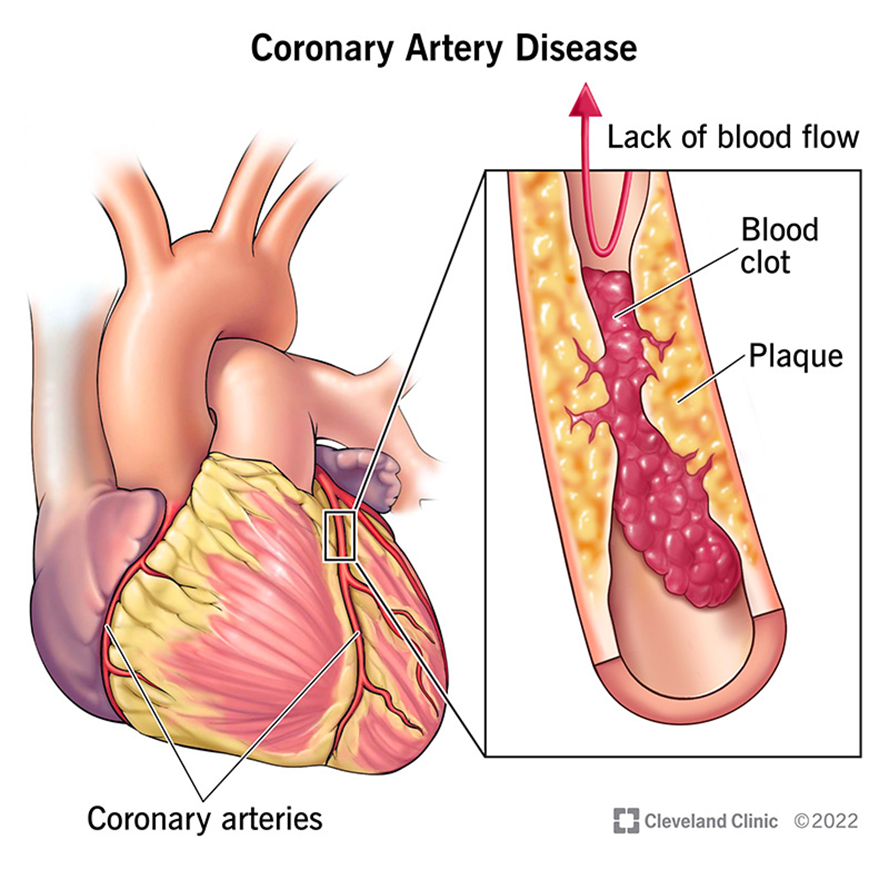Before administering the initial dose of sumatriptan succinate to a client with a migraine headache, it is most important to determine if the client’s history includes which problem?
Irritable bowel syndrome.
Coronary artery disease.
Seasonal allergic rhinitis.
Type 2 diabetes mellitus.
The Correct Answer is B
Choice A reason:
Irritable bowel syndrome (IBS) is not a primary concern when administering sumatriptan succinate. While IBS can cause significant discomfort and affect the quality of life, it does not pose a direct contraindication to the use of sumatriptan. Sumatriptan is primarily metabolized in the liver and excreted by the kidneys, and its use is not significantly impacted by gastrointestinal conditions like IBS1.
Choice B reason:
Coronary artery disease (CAD) is a critical consideration before administering sumatriptan succinate. Sumatriptan is a selective serotonin receptor agonist that causes vasoconstriction of cranial blood vessels to relieve migraine symptoms. However, it can also cause vasoconstriction in coronary arteries, which can be dangerous for clients with CAD. This can lead to serious cardiovascular events such as myocardial infarction or angina. Therefore, it is essential to assess for any history of CAD or other significant cardiovascular conditions before administering this medication.

Choice C reason:
Seasonal allergic rhinitis is not a significant concern when administering sumatriptan succinate. While allergic rhinitis can cause symptoms such as nasal congestion, sneezing, and itching, it does not interact with the pharmacological action of sumatriptan. Therefore, it is not a contraindication for the use of this medication.
Choice D reason:
Type 2 diabetes mellitus is not a primary concern when administering sumatriptan succinate. Although diabetes can increase the risk of cardiovascular disease, the presence of diabetes alone does not contraindicate the use of sumatriptan. However, it is important to consider the overall cardiovascular risk profile of the client, including any complications related to diabetes.
Nursing Test Bank
Naxlex Comprehensive Predictor Exams
Related Questions
Correct Answer is D
Explanation
Choice A reason:
Decreased episodes of incontinence are not a relevant outcome of administering zolpidem. Zolpidem is a sedative-hypnotic medication primarily used to treat insomnia by enhancing the activity of GABA, an inhibitory neurotransmitter. It does not affect urinary function or bladder control. Incontinence may be caused by other factors such as aging, prostate problems, or urinary tract infections, but it is not influenced by zolpidem.
Choice B reason:
Improved ability to concentrate is not a pertinent outcome of administering zolpidem. This medication does not enhance cognitive function or attention span. In fact, zolpidem may impair memory and cause daytime drowsiness or confusion in some patients. Its primary function is to induce sleep, not to improve concentration.
Choice C reason:
Exhibiting fewer emotional outbursts is not a significant outcome of administering zolpidem. This medication does not affect mood or behavior. In some cases, zolpidem may cause paradoxical reactions such as agitation, aggression, or hallucinations, especially in older adults. Therefore, it is not used to manage emotional outbursts.
Choice D reason:
Sleeps soundly through the night is the desired outcome of administering zolpidem. This medication is specifically designed to treat sleep problems, particularly difficulty falling asleep or staying asleep. By enhancing the activity of GABA, zolpidem helps induce and maintain sleep, which is the primary goal when prescribing this medication to patients with insomnia.
Correct Answer is D
Explanation
Choice A reason: While it is true that breastfeeding is not recommended while taking isotretinoin due to the potential for adverse effects on the infant, this is not the most critical information for a client planning to become pregnant. The primary concern is the teratogenic effects of isotretinoin, which can cause severe birth defects.
Choice B reason: Advising the client not to take multiple vitamins that contain vitamin A while on isotretinoin is important because excessive vitamin A can increase the risk of toxicity. However, this is not the most crucial information for someone planning to become pregnant. The teratogenic risks of isotretinoin are a higher priority.
Choice C reason: Obtaining baseline liver function results is necessary during isotretinoin therapy due to the potential for hepatotoxicity. Regular monitoring helps ensure the liver is functioning properly. However, this information is secondary to the need to avoid pregnancy while on isotretinoin due to its severe teratogenic effects.
Choice D reason: Discontinuing isotretinoin one month before attempting to conceive is the most important information. Isotretinoin is highly teratogenic and can cause serious birth defects. It is crucial to stop the medication well before conception to ensure it is completely cleared from the body, reducing the risk of harm to the fetus.
Whether you are a student looking to ace your exams or a practicing nurse seeking to enhance your expertise , our nursing education contents will empower you with the confidence and competence to make a difference in the lives of patients and become a respected leader in the healthcare field.
Visit Naxlex, invest in your future and unlock endless possibilities with our unparalleled nursing education contents today
Report Wrong Answer on the Current Question
Do you disagree with the answer? If yes, what is your expected answer? Explain.
Kindly be descriptive with the issue you are facing.
